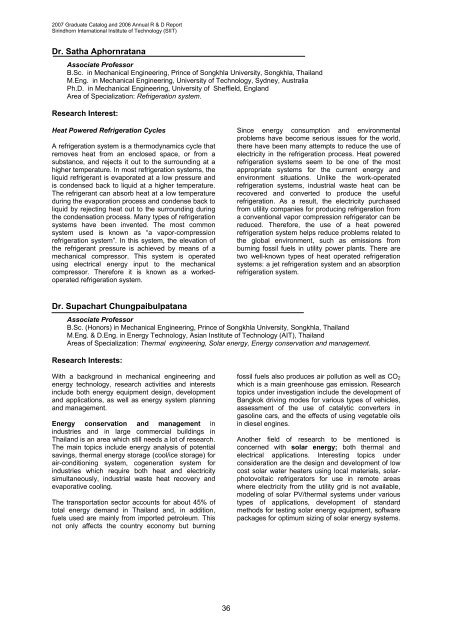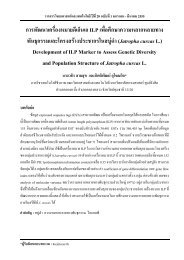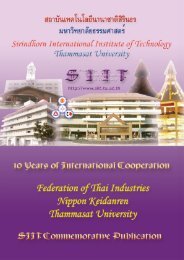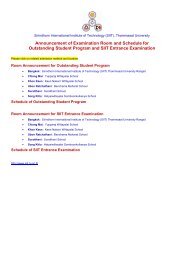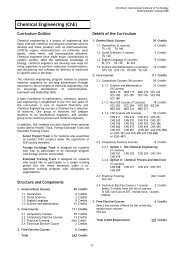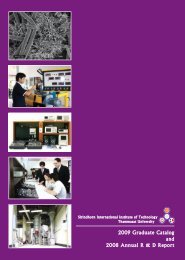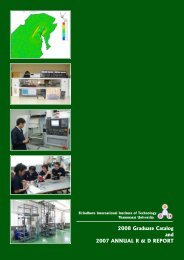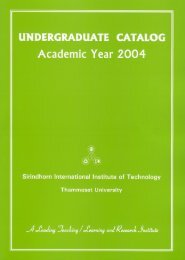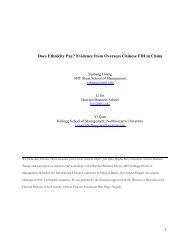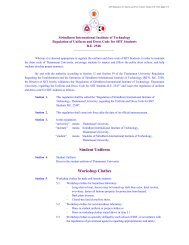2007 Graduate Catalog and 2006 Annual R & D Report - Sirindhorn ...
2007 Graduate Catalog and 2006 Annual R & D Report - Sirindhorn ...
2007 Graduate Catalog and 2006 Annual R & D Report - Sirindhorn ...
You also want an ePaper? Increase the reach of your titles
YUMPU automatically turns print PDFs into web optimized ePapers that Google loves.
<strong>2007</strong> <strong>Graduate</strong> <strong>Catalog</strong> <strong>and</strong> <strong>2006</strong> <strong>Annual</strong> R & D <strong>Report</strong><br />
<strong>Sirindhorn</strong> International Institute of Technology (SIIT)<br />
Dr. Satha Aphornratana<br />
Associate Professor<br />
B.Sc. in Mechanical Engineering, Prince of Songkhla University, Songkhla, Thail<strong>and</strong><br />
M.Eng. in Mechanical Engineering, University of Technology, Sydney, Australia<br />
Ph.D. in Mechanical Engineering, University of Sheffield, Engl<strong>and</strong><br />
Area of Specialization: Refrigeration system.<br />
Research Interest:<br />
Heat Powered Refrigeration Cycles<br />
A refrigeration system is a thermodynamics cycle that<br />
removes heat from an enclosed space, or from a<br />
substance, <strong>and</strong> rejects it out to the surrounding at a<br />
higher temperature. In most refrigeration systems, the<br />
liquid refrigerant is evaporated at a low pressure <strong>and</strong><br />
is condensed back to liquid at a higher temperature.<br />
The refrigerant can absorb heat at a low temperature<br />
during the evaporation process <strong>and</strong> condense back to<br />
liquid by rejecting heat out to the surrounding during<br />
the condensation process. Many types of refrigeration<br />
systems have been invented. The most common<br />
system used is known as “a vapor-compression<br />
refrigeration system”. In this system, the elevation of<br />
the refrigerant pressure is achieved by means of a<br />
mechanical compressor. This system is operated<br />
using electrical energy input to the mechanical<br />
compressor. Therefore it is known as a workedoperated<br />
refrigeration system.<br />
Since energy consumption <strong>and</strong> environmental<br />
problems have become serious issues for the world,<br />
there have been many attempts to reduce the use of<br />
electricity in the refrigeration process. Heat powered<br />
refrigeration systems seem to be one of the most<br />
appropriate systems for the current energy <strong>and</strong><br />
environment situations. Unlike the work-operated<br />
refrigeration systems, industrial waste heat can be<br />
recovered <strong>and</strong> converted to produce the useful<br />
refrigeration. As a result, the electricity purchased<br />
from utility companies for producing refrigeration from<br />
a conventional vapor compression refrigerator can be<br />
reduced. Therefore, the use of a heat powered<br />
refrigeration system helps reduce problems related to<br />
the global environment, such as emissions from<br />
burning fossil fuels in utility power plants. There are<br />
two well-known types of heat operated refrigeration<br />
systems: a jet refrigeration system <strong>and</strong> an absorption<br />
refrigeration system.<br />
Dr. Supachart Chungpaibulpatana<br />
Associate Professor<br />
B.Sc. (Honors) in Mechanical Engineering, Prince of Songkhla University, Songkhla, Thail<strong>and</strong><br />
M.Eng. & D.Eng. in Energy Technology, Asian Institute of Technology (AIT), Thail<strong>and</strong><br />
Areas of Specialization: Thermal engineering, Solar energy, Energy conservation <strong>and</strong> management.<br />
Research Interests:<br />
With a background in mechanical engineering <strong>and</strong><br />
energy technology, research activities <strong>and</strong> interests<br />
include both energy equipment design, development<br />
<strong>and</strong> applications, as well as energy system planning<br />
<strong>and</strong> management.<br />
Energy conservation <strong>and</strong> management in<br />
industries <strong>and</strong> in large commercial buildings in<br />
Thail<strong>and</strong> is an area which still needs a lot of research.<br />
The main topics include energy analysis of potential<br />
savings, thermal energy storage (cool/ice storage) for<br />
air-conditioning system, cogeneration system for<br />
industries which require both heat <strong>and</strong> electricity<br />
simultaneously, industrial waste heat recovery <strong>and</strong><br />
evaporative cooling.<br />
The transportation sector accounts for about 45% of<br />
total energy dem<strong>and</strong> in Thail<strong>and</strong> <strong>and</strong>, in addition,<br />
fuels used are mainly from imported petroleum. This<br />
not only affects the country economy but burning<br />
fossil fuels also produces air pollution as well as CO 2<br />
which is a main greenhouse gas emission. Research<br />
topics under investigation include the development of<br />
Bangkok driving modes for various types of vehicles,<br />
assessment of the use of catalytic converters in<br />
gasoline cars, <strong>and</strong> the effects of using vegetable oils<br />
in diesel engines.<br />
Another field of research to be mentioned is<br />
concerned with solar energy; both thermal <strong>and</strong><br />
electrical applications. Interesting topics under<br />
consideration are the design <strong>and</strong> development of low<br />
cost solar water heaters using local materials, solarphotovoltaic<br />
refrigerators for use in remote areas<br />
where electricity from the utility grid is not available,<br />
modeling of solar PV/thermal systems under various<br />
types of applications, development of st<strong>and</strong>ard<br />
methods for testing solar energy equipment, software<br />
packages for optimum sizing of solar energy systems.<br />
36


